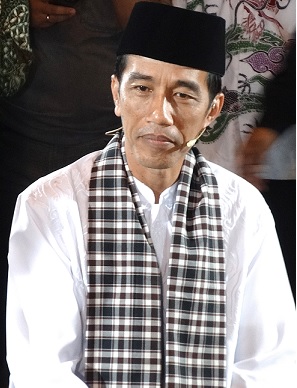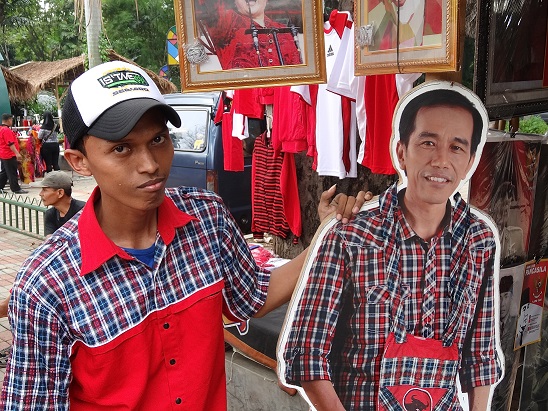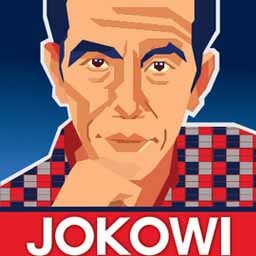Jokowi’s record in public office justifies his strong public image
Christian von Lübke
nice.or.idNever in recent years has an Indonesian politician engendered such enthusiasm and optimism as Jakarta’s governor Joko Widodo, known as ‘Jokowi.’ For many domestic and foreign observers the people-centred, hands-on leadership style of the self-made man from Central Java marks a welcome departure from status quo politics. In a time where political apathy and disenchantment are on the rise – fuelled by countless cases of public misconduct and corruption – Jokowi’s stellar ascent to power is widely seen as a harbinger of a more responsive and participatory leadership.
At the same time, critical voices question whether Jokowi can deliver on his reform promises. In the eyes of sceptical observers, the former mayor of Solo already finds himself entangled in web of entrenched interests, power brokers, and campaign financiers. Moreover, sceptics point to his limited national and international experience and question his ability to strike the right balance between pro-poor policies, on the one side, and market-preserving strategies on the other.
To assess the current hype that surrounds Jokowi and his potential presidential nomination, it is helpful to take a closer look at the image he projects and trace his early political career as mayor of Solo, an office he held between 2005 and 2012. A review of his political ascent shows that his popular appeal rests on a number of heterodox characteristics that set him apart from other presidential contenders. These include his non-establishment background, reformist and even-handed leadership, and genuine efforts to address problems on Main Street. While sceptics see him as being in the firm grip of established elites and oligarchic interests, the pluralist nature of his support network – which transcends ethnic, economic, and administrative boundaries – bodes well for an inclusive and less particularistic form of policy-making.
Non-establishment background
Jokowi’s first major asset is that he has credibly positioned himself as coming from outside the political establishment. Much of the current excitement about his candidacy rests on the fact that Jokowi is the ‘maverick’ candidate in an electoral line-up of many old (and not particularly popular) faces. The idea of a non-establishment contender from the midst of society – who is not a scion of a political dynasty, nor a business tycoon, nor a ranking army general, and who actually listens to people’s concerns – has stirred much enthusiasm.
Jokowi’s midst-of-society image is reinforced by his humble upbringing in rural Java. In a personal interview in 2008, he proudly noted that he was descended from a family of small furniture producers in Solo. After completing his engineering degree in the forestry department at Gadjah Mada University in nearby Yogyakarta, he followed in his grandfather’s and father’s footsteps and set up his own furniture business in Solo in 1987. For almost 20 years he expanded his operations, partly by fostering export ties to Singapore and Europe, before he decided to run for mayor. As a successful medium-sized entrepreneur, Jokowi was able to draw on private assets to fund his campaigns. In 2010, his personal wealth – including inherited properties, a furniture factory, and mobile assets – was officially reviewed and estimated at $US1.5 million (Rp. 18 billion); a value that places him among the well-to-dos in Central Java, but pales in comparison to the wealth levels of Jakarta’s politico-business elites, such as Aburizal Bakrie, Jusuf Kalla, or Prabowo Subianto.
A key motivation for entering the political game, Jokowi argued, was his rising dissatisfaction with Solo’s public officials – who provided inadequate services, sought rents rather than solutions, and disregarded people’s pressing concerns. ‘Solo’s officials adhere to lengthy administrative procedures’, he told me. ‘Bureaucrats do not operate like business people. Many public officials do not implement my ideas or instructions because they are either unwilling or unable to do so.’
Clean and equitable government record
His second political asset is his success in launching broad public reforms. His reputation for policy success is well deserved. His term of office in Solo reveals a balanced policy portfolio, which entailed benefits for less well-to-do communities as well as large business sectors. The combination of pro-poor and pro-investment achievements was made possible by two things: his success in addressing public misconduct and red tape, on the one hand, and his ability to strike a balance between small and large economic actors’ interests on the other.
During my visits to Solo, I had the opportunity to observe what seemed like genuine concern for public reform and good government on Jokowi’s part. Facing deep-seated problems of inefficiency and corruption within his bureaucracy, Jokowi opted for a strategy of unannounced checks, merit-based promotions, and increased citizen scrutiny of public officials. According to local officials, one key driver of improved performance was Jokowi’s random visits to various government units – during which he made it a habit to inspect staff attendance, routine operations, and service standards.
Unlike former incumbents, Jokowi signalled that he was prepared to track everyone’s performance and penalize non-compliance and misconduct. During his first tenure in Solo, two senior bureaucrats were demoted for embezzling public funds. Others were kept on their toes by new means of oversight. For one thing, he scheduled regular audits and public hearings; for another he promoted an SMS-powered complaint system, which provided local citizens with a sounding board for complaining about dismal and corrupt service provision. ‘We were never quite sure’, a senior official in Solo recalled, ‘when the mayor would drop into our office. His unannounced inspections and scrutiny of our routine work required us to be at our best’.
 Marcus MieztnerAnother key success point was achieving balance between small and large-scale interests – as well as traditional and modern views on Solo’s city planning. This was particularly evident in the market renewal and relocation program that Jokowi introduced in the mid-2000s. For decades, prime city locations had been occupied by informal street vendors and peddlers’ markets – and hence remained inaccessible for real estate and retail developers. In an interview, the former mayor stated that the key objective was to ‘create a modern city that maintains its heritage. It is important to strengthen traditional businesses and markets but, at the same time, Solo is changing. We need to accommodate new investments and urban development’.
Marcus MieztnerAnother key success point was achieving balance between small and large-scale interests – as well as traditional and modern views on Solo’s city planning. This was particularly evident in the market renewal and relocation program that Jokowi introduced in the mid-2000s. For decades, prime city locations had been occupied by informal street vendors and peddlers’ markets – and hence remained inaccessible for real estate and retail developers. In an interview, the former mayor stated that the key objective was to ‘create a modern city that maintains its heritage. It is important to strengthen traditional businesses and markets but, at the same time, Solo is changing. We need to accommodate new investments and urban development’.
To balance existing and incoming interests, Jokowi applied a three-step approach. First, he advised city planners to adjust zoning proposals and earmark funds for the restoration and remodelling of traditional market spaces. Second, he convinced a large majority of street vendors to peacefully relocate their operations to designated areas – in part by providing subsidised access to all-weather market stalls and micro-credit. Third, he streamlined licensing procedures and provided professional support for incoming and established investors.
The tradition-meets-modernity maxim is also exemplified in Jokowi’s regulatory decisions: on the one hand, he rejected provincial plans to transform Solo’s Saripetojo heritage site into a shopping mall; on the other hand, he abolished a traditionalist by-law that constrained investments in modern construction projects by stipulating that no building may ever exceed the spire of the sultan’s palace (and hence a height of 35 metres).
Many of the former mayor’s initiatives have borne fruit. A majority of the city’s street vendors have formalised their business. They have settled into Solo’s traditional markets and – in many cases – managed to improve their livelihoods. At the same time, high-rise hotels, apartment buildings, and retail properties– such as Solo Paragon, Center Point, Kusuma Tower, and Solo Square – have sprung up in the city centre, providing impetus for local employment and tourism.
Jokowi’s ability to mediate diverging interests, reduce administrative red tape, and create new economic opportunities has catapulted Solo to the top ranks in national governance and business attractiveness surveys. It also reinforced his image as a responsive and reformist leader. Surfing a wave of rising popularity, Jokowi was re-elected mayor with 90.1 per cent of the vote in 2010, received the Interior Ministry award of ‘Best Mayor’ in 2011, featured as a runner-up for the ‘World Mayor Prize’ in early 2012, and was elected governor of Jakarta – unseating the well-financed incumbent, Fauzi Bowo – in September 2012.
Street democracy
The third facet that has contributed to Jokowi’s popularity is his participatory, people-centred leadership style. Ever since he held public deliberations with Solo’s street vendors, Jokowi has made it a habit to listen to, talk with, and attend to local people and their concerns. Between 2006 and 2008, the former mayor discussed, cajoled, and negotiated tirelessly with Solo’s street peddlers, small-holder associations, real estate developers, and business chambers. As one businessman put it: Jokowi stood out for ‘listening to people from all walks of life with great endurance. He attended over 70 discussion rounds with opposing parties, seeking consensus for relocation modalities, time schedules, and compensation schemes.’ Owing to this deliberative effort, many citizens in Solo concur, the relocation program was a resounding success.
Similar deliberation efforts have recently been underway in Jakarta’s Tanah Abang neighbourhood, a congested and unruly part of town with hundreds of street vendors who face dire conditions and clog up one of Jakarta’s busiest boulevards. Consensus here has previously been elusive – not least because shady officials and protection racketeers have mobilised resistance to relocation plans in order to protect the rents they gather from stallholders. But eventually Jokowi’s ‘street democracy’ yielded results. After a lengthy series of public hearings and deliberative sessions, Tanah Abang’s street vendors agreed to relocate operations to subsidised indoor kiosks in a nearby market complex, though this problem is still not entirely resolved.
In contrast to other potential contenders, Jokowi’s street-level engagement is not merely a matter of publicity, but a reflection of mature conviction. Considering his experience in Solo, Jokowi can credibly claim that he has an open ear for the people on Main Street.
Believe the hype?
Does Jokowi have what it takes to run for president? This essay, which traced some of the novel features of Jokowi’s leadership and linked them his early years in Solo, does not provide a conclusive answer. The complexity of a task increases with its scope. Although Jokowi has skilfully tackled municipal and big-city problems, it is difficult to predict whether his skillsets and political acumen will suffice to meet national challenges effectively.
What is clear, however, is that Jokowi is a person who thinks and acts outside the box. He has demonstrated in Solo and Jakarta that he is determined and skilful enough to strike a balance between conflicting economic and political interests. This ability bodes well for future conciliation efforts that reach across ethno-religious or social divides. The close and trusting relationship he has developed with his deputy governor, Basuki Purnama (commonly known as Ahok), a protestant Chinese Indonesian, is a case in point. Another illustration of Jokowi’s integrative efforts – which I personally observed in February 2008 – was his decision to rename one of Solo’s streets Jalan Yap Tjwan Bing in honour of a Chinese Indonesian post-war dignitary at a well-attended Chinese new year ceremony.
 Marcus Mietzner
Marcus Mietzner
His balanced and inclusive approach also bodes well for socio-economic development. A close look at Jokowi’s policy mix highlights that pro-poor policies do not need to come at the expense of economic progress. His political success rests in part in his ability to identify and negotiate win-win solutions that accommodate small and large-scale interests. During his tenure in Solo and Jakarta, Jokowi has combined measures of redistribution with efforts to improve the investment climate.
Somewhat more problematic is the question whether some of the financial and political debts, which Jokowi incurred on the gubernatorial campaign in 2012, will come to haunt him. To be sure, critics are quick to point out that these obligations are largely owed to two Indonesian party bosses: Prabowo Subianto and Megawati Sukarnoputri, the chairs of Gerindra and PDI-P respectively. Arguably, by pledging his support to Jokowi, Prabowo – a New Order general-turned-businessman eager to improve his public image – could capitalise on Jokowi’s good governance record and further obfuscate his controversial past. Similarly, Megawati’s endorsement of Jokowi, announced at a later stage of the gubernatorial race (the delay was partly because some PDI-P functionaries favoured incumbent Bowo), yielded high party approval rates and favourable publicity.
These mutual benefits put the notion of indebtedness in perspective. Against this backdrop, an overly pessimistic view characterising Jokowi as political minion in a larger game of oligarchic interests seems implausible. For one thing, Jokowi’s support network involves many pribumi and Chinese Indonesian businesses outside Jakarta, who have come to trust and value his leadership as a mayor in Solo. For another, there is little reason to believe that his supporters constitute a homogenous group whose collective interests threaten to distort future executive decisions. It is much more plausible to think of the people backing him as constituting a distinctly pluralist amalgam of interests comprising multiple ethnicities, economic sectors, and localities. While such a support base may not shield his presidency from political influence, it will certainly help to ensure that it is not captured by any narrow group.
Believe the hype
All in all, is the hype that surrounds Jokowi’s candidacy justified? I believe it is. Thus far, Jokowi’s image as a non-establishment reformer and even-handed problem solver is consistent with and supported by his political actions in Solo and Jakarta. The humble upbringing outside the capital gives him roots deep in the midst of society; whereas his business background provides a critical lens on government inefficiency and misconduct. It is this balanced non-state perspective, combined with a proven track record of reform, that explains and justifies Jokowi’s appeal in recent polls. Undoubtedly, this maverick mix resonates well with the Indonesian electorate, but it also evokes resistance among status quo elites. Jokowi’s ability to steer though turbulent political waters, without losing his reformist edge and even-handedness, will prove to be the enduring challenge of the future.
Christian von Lübke (cv1002@politik.uni-freiburg.de) is a Senior Research Fellow at the Department for Political Science, Freiburg University.











